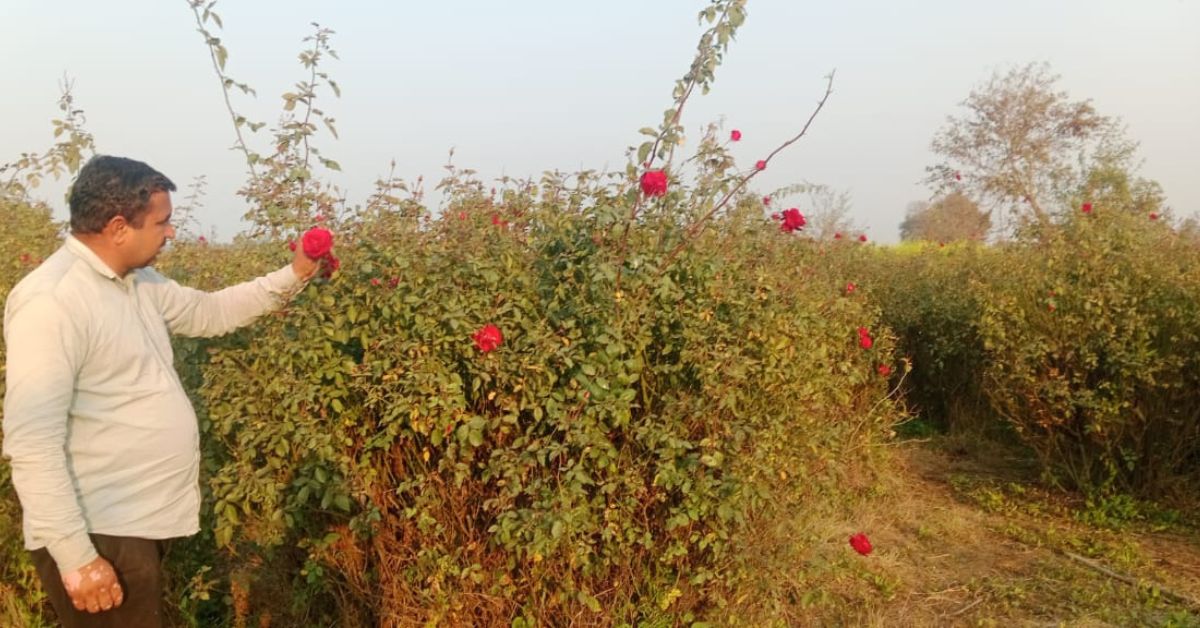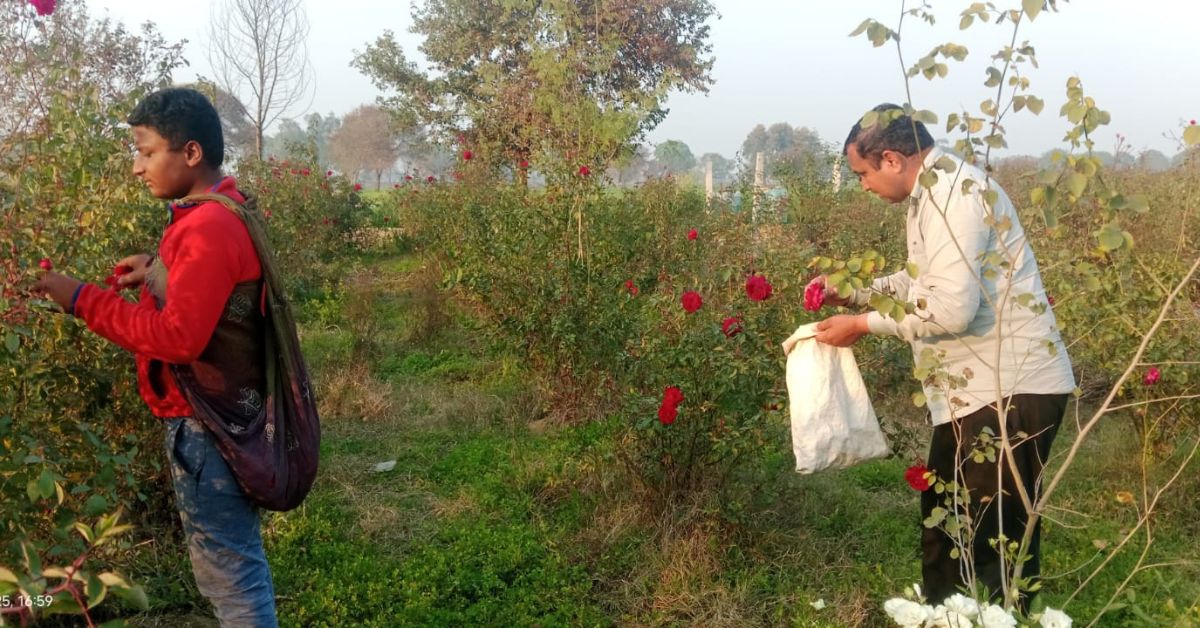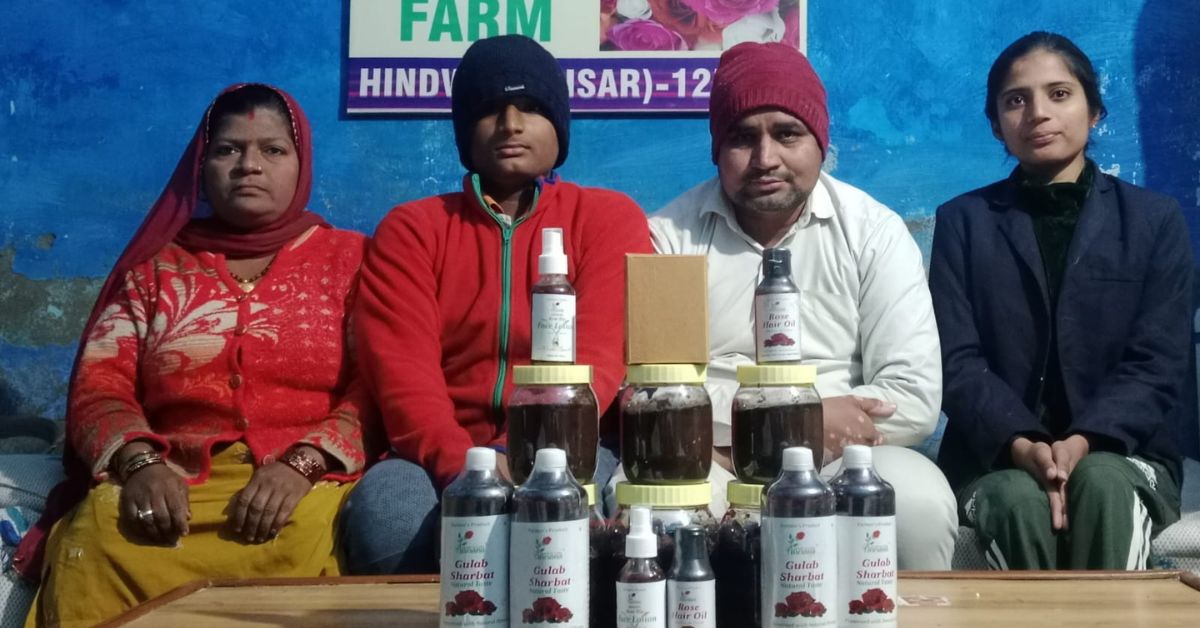In the narrow lanes of Haryana’s Hindwan village, a unique fragrance drifts through the air — one that symbolises the remarkable journey of Rajesh Kumar, who transformed his life despite the odds stacked against him.
Rajesh’s life was marked by a series of struggles.
Born with vision impairment, securing stable employment was a monumental challenge for him. “I suffer from genetic disorder retinitis pigmentosa and macular degeneration. My visual field is 10 degrees [considered blindness] as compared to the 180-degree peripheral expanses most enjoy,” he shares. “Because of this, finding traditional work was an uphill struggle.”
From displaying tiles in a shop to working as a security guard and washing cars, Rajesh toiled at humble tasks until even these opportunities dimmed. By 2014, his earnings barely helped him make ends meet.
“Even with all my efforts, I could manage to earn only around Rs 5,000 a month. Most of this amount would get exhausted clearing debts for groceries and milk. When my children would ask me for pencils and copies, I would be forced to turn down their smallest requests,” he recalls.

Despite the despair, there was an undying spark of hope. The turning point in his life came in 2015 when Rajesh ventured into rose farming.
The Class 10 graduate now runs a successful business by selling value-added products made using rose petals — such as gulkand (rose petal jam), rose water, sherbet, rose hair oil, and rose bath soap.
Battling both societal challenges and physical limitations, he did not just set up a thriving rose farm but rebuilt his life.
Blooming against the odds
It was while working as a security guard in a factory in his village that a chance conversation with the gardener stirred a glimmer of intrigue in Rajesh.
“The gardener told me that he wanted to take some time off work. When I asked him the reason for his absence, he said he had the work of planting 1,000 saplings on a farm. When he came back, I enquired about rose farming and he told me about its profitability and market demand. It captured my interest as the wheat that I grew on my farm hardly fetched me any income,” he says.
Although Rajesh had six kanals [1 kanal = 0.125 acre] of land, only two kanals were free to test this new venture. So in 2015, Rajesh took his first step by planting marigolds while learning the ropes of the floral market. “I started with marigold cultivation because it is a simpler and less risky crop. It provided quick returns and valuable market insights,” he adds.

The next year brought a bolder experiment as he planted 1,000 rose saplings amidst the marigold plants.
As the roses began to bloom by October, Rajesh saw not merely flowers but the beginnings of a sustainable income. “I was earning Rs 300 a day just by selling fresh roses. This elevated my monthly income to Rs 9,000 — nearly double my previous earnings,” he states, the pride evident in his voice.
Earning 10 times more with organic rose farming
Adopting organic farming practices, Rajesh uses cow dung, vermicompost, mustard cakes, and groundnut cakes to fertilise the soil. He also prepares Gokripa Amrit, an organic concoction to deter pests. Sharing the secret to this natural insecticide, he says, “To prepare this, take five litres of lassi and mix it with five to seven litres of cow urine and five to seven kilograms of jaggery.”
“Transfer the contents into a 500-litre tank and fill the container with water. It takes about seven days to prepare the insecticide. When you spray this mixture on plants, remember to add a small packet of asafoetida powder (hing) to it. This creates a strong pungent smell that shoos away pests,” he informs, adding, “Spray it once every week for good results.”
Gradually, Rajesh and his family ventured into value addition, inspired by suggestions from his children’s school teachers. They began with rosewater in repurposed bottles and soon innovated by making gulkand (rose jam), marketing it to local schools and villagers. Word quickly spread about the therapeutic benefits of his rose-based products, particularly for skin ailments.

Around the same time, Rajesh also undertook formal training from the Haryana Agricultural University to learn about value addition. His products like gulkand got validation from the Indian Council of Agricultural Research (ICAR), Ludhiana. “The officials also helped me secure an FSSAI licence. So after lab tests and nutritional analysis, I was able to market my homemade products to a wider market,” he adds.
Managing the day-to-day activities of the farm remains a challenge, given Rajesh’s limited vision, but his wife, Sunita, and children have become his pillars of support. “I only handle the travelling and delivery of products. Before leaving for school, my children pluck flowers from the farm, and my wife tends to the plants. She also prepares all the value-added products herself,” says Rajesh, who is immensely grateful to his family.
By 2018, with the support of Sunita, they were able to propagate rose cuttings and expand their rose farm to four kanals. Sunita, busy preparing gulkand at their home, tells The Better India, “Unlike other households in the village, we do not have many livestock to look after. So while other women tend to their cattle in the morning, I take care of our rose plants. I spend my afternoons making rose products like gulkand and rose water. It is a collective effort — our children help in packaging and labelling, while my husband handles the marketing.”
Today, Rajesh sells his value-added products under his brand, ‘Parerana Flower Farm’, across Haryana, Ludhiana, and Chandigarh. His income soared to Rs 50,000 per month. The journey, however, wasn’t void of naysayers.
“Many people doubted if selling flowers would even yield significant profits, especially when I intended to grow on a small patch of land compared to others. They often pitied me and suggested I return to menial jobs,” he shares.
But Rajesh was determined to overturn scepticism, seeing potential beyond the scope of disability-imposed challenges. His tenacity is as rich as the fragrance of his roses. “Disability should not stifle our spirit. Given the right mix of positivity and perseverance, the seeds of success can sprout in the most unlikely of places. So, we must continue to trust ourselves, remain dedicated, and success will eventually follow,” he remarks.
Edited by Pranita Bhat; All images courtesy Rajesh Kumar
No comments:
Post a Comment